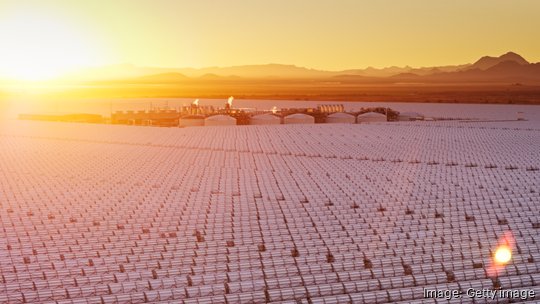
With abundant solar energy and a fast-growing electric vehicle industry, Arizona stands out as a leader in green industries. Now, the state is adding to its reputation as a hub for sustainability with a new emerging industry of CarbonTech.
CarbonTech involves the removal of CO2 from the environment and industrial processes through various techniques including carbon storage, carbon capture, carbon conversion and more.
An example of this technology in action can be found in Flagstaff, Arizona, where Block-Lite, a family-owned manufacturer of masonry blocks, is teaming up with CarbonTech companies Aircapture and CarbonBuilt to reduce emissions.
Here’s how the partnership is designed to work. At Block-Lite’s Flagstaff facility, Aircapture will build multiple direct-air-capture machines, which remove CO2 from the surrounding air and store it for later use. That CO2 will then be used by CarbonBuilt, which has developed a unique method of making concrete blocks using CO2 as a main ingredient. The result is a reduction of emissions resulting from concrete production by as much as 70% with a byproduct of ready-to-use concrete building materials.
“It’s a win-win because it makes good business sense and good stewardship sense, too,” said Ryan Ross, Block-Lite’s CEO. “I think it will change the perception of our industry, too, and show that we can do what we have been doing and still be sustainable.”
The partners won a $150,000 grant from the 4 Corners Carbon Coalition, a network of local governments including the city of Flagstaff to launch what the coalition calls the world’s first project using captured CO2 to produce alternative cement.
It should come as no surprise that the novel project is taking off in Arizona.
Brimming with world-renowned scientists and advanced manufacturing industry innovators, the Grand Canyon State is positioned to lead global efforts to reduce the world’s carbon footprint.
“Without question, the frontier of carbon removal and reduction is here in our state,” said Sangeev Khagram, dean and director general of ASU’s Thunderbird School of Global Management, which in 2021 launched the Global Carbon Removal Partnership. “We are taking our projects and experiences here and saying, ‘This can be done all around the world.’”
CarbonTech is a rapidly emerging industry that received considerable attention in the 2022 Inflation Reduction Act (IRA). The IRA contains $500 billion in funding directed toward financing research, development and commercialization of leading-edge technologies, such as carbon capture and storage and clean hydrogen.
In addition to projects like Block-Lite’s, Arizona is home to a multitude of CarbonTech initiatives.
- Plans were announced recently for the construction of a solar-powered, carbon-neutral cobalt sulfate production facility in Yuma County. The $200 million EVelution Energy facility will be the first cobalt production facility in the U.S. and produce batteries for electric vehicles.
- ASU’s Center for Negative Carbon Emissions “planted” the first-of-its-kind MechanicalTree on Tempe’s campus. Built by Dublin-based Carbon Collect, the tall metal structure features tiles that use wind to capture CO2. The tiles collapse into a regenerating chamber which removes the carbon to be buried or repurposed.
- The University of Arizona, Northern Arizona University and ASU, along with the state’s four major energy providers, are working together to build a clean hydrogen ecosystem in Arizona. Their Center for an Arizona Carbon-Neutral Economy is pursuing strategies to advance hydrogen, which can fuel chemical reactions that release clean energy and produce only water.
- The Center also invited three dozen private, public and tribal organizations, including the Arizona Commerce Authority, to form the Southwest Clean Hydrogen Innovation Network (SHINe), which is applying for federal funding to develop a desert Southwest clean hydrogen hub.
In 2020, the Flagstaff City Council became one of the first municipalities in the U.S. to commit to CO2 removal. It plans to be carbon neutral by 2030.
“Is it ambitious? Yes. Is it doable? Absolutely,” said Nicole Antonopoulos, the city’s sustainability director. “We can make an impact, create opportunities, spark investment and business. Innovation and opportunity are moving the needle everywhere.”
Chris Neidl, founder of OpenAir, a volunteer network that advances carbon dioxide-removal projects, says carbon removal can play a role in every leading and aspiring sector in Arizona, such as agriculture, desalinization, carbon-neutral jet fuels and data centers
“Concrete is a really important sector for this very young technology to penetrate because there’s so much of it,” he said. “It’s exciting to see states like Arizona, with fast-growing economies, involved.”
To learn more about how Arizona is advancing sustainable initiatives, visit www.azcommerce.com/big-ideas/renewable-energy.


